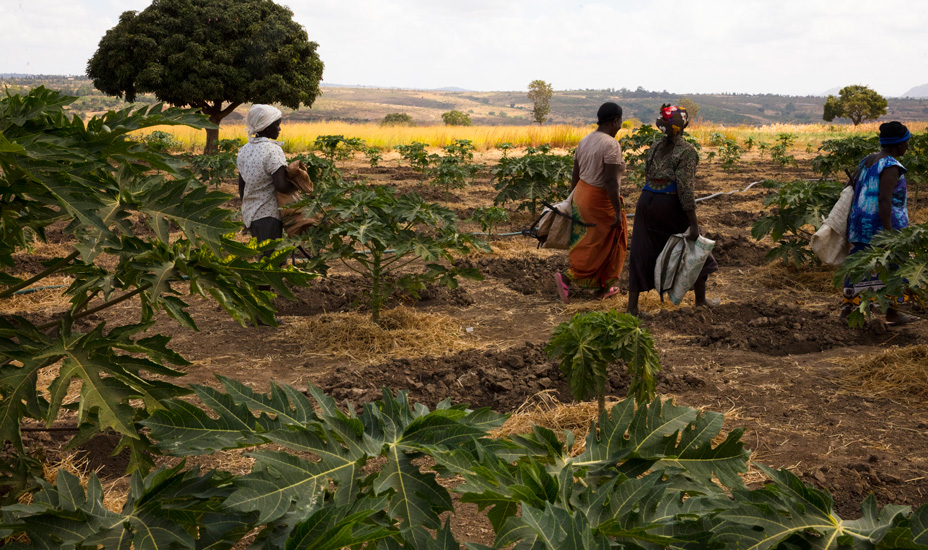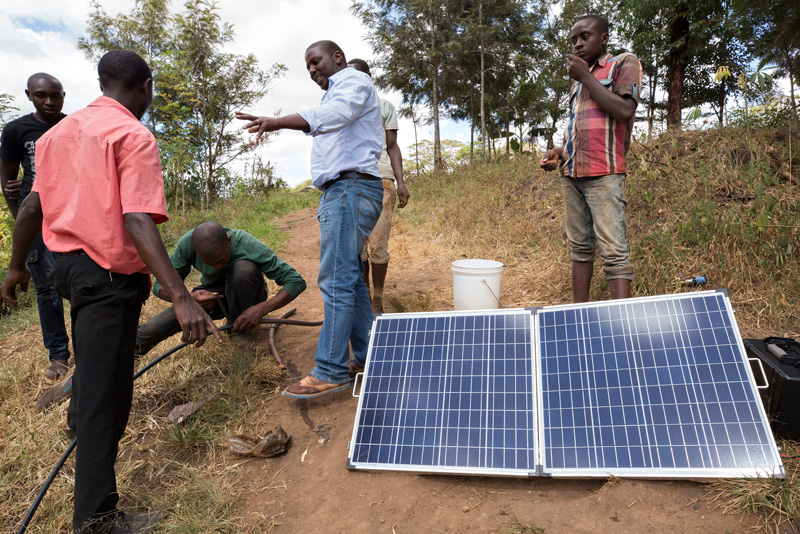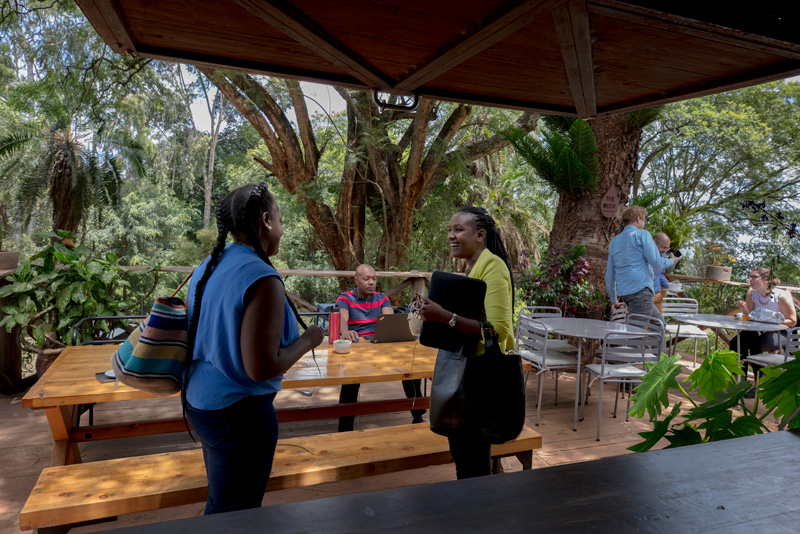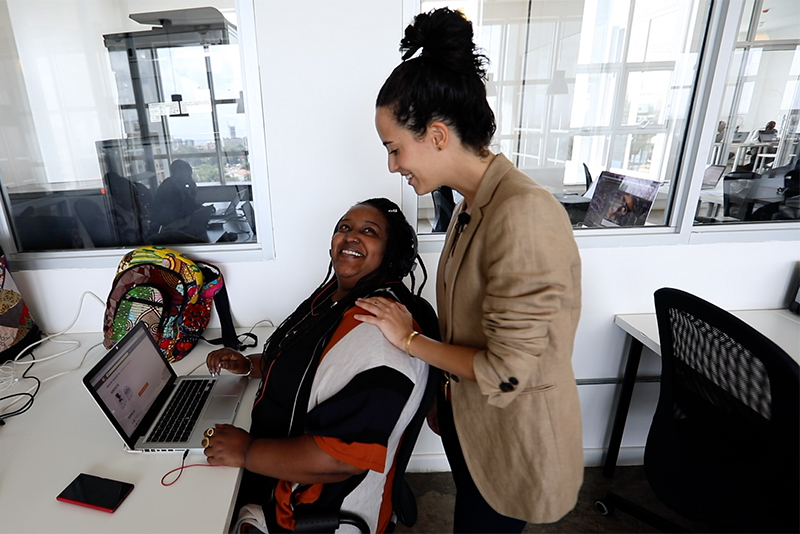
 By Idil Abshir, IFC Communications
By Idil Abshir, IFC Communications
Near dusk on a weekday night, about 15 people were seated in a conference room at the Nairobi Garage, home to the city’s newest technology start-ups. The sun was low on the horizon as a man talked animatedly about blockchain technology and the solutions it could offer to Africa’s infrastructure problems.
This scene would have been unimaginable just a few years ago. But spaces like the Nairobi Garage are spreading throughout the city, and discussions on the latest technological breakthroughs are common—fresh evidence that the spirit of entrepreneurship is blossoming here, despite Nairobi’s challenges.
High-Tech Start-Ups Transforming Africa
Nairobi Garage, founded in 2013, takes up three floors in a high-rise building in downtown Nairobi. It is sleek and well-lit, the white and light wood furniture and open floor plan make it seem bigger than it is. Members of the co-op working space use a mobile phone app to unlock the doors. Several people were scattered throughout the open-plan office, or clustered in conference rooms along the perimeter.

The Nairobi Garage isn’t the first incubator for entrepreneurship in Kenya. The country already is well known for its mobile-money revolution. M-Pesa, a mobile-money platform powered by the country’s largest mobile service provider, has made banking possible for the majority of the population. As of 2017, M-Pesa had 27 million customers over a network of 136,000 agents. In February 2018, Google enabled M-Pesa as a payment option in its app store.
Across sub-Saharan Africa, technology and entrepreneurship have started to transform the continent in many ways. Digital solutions in health, agriculture, commerce, energy, and countless other industries have provided services where none had existed before. That is allowing several countries to “skip steps in the development ladder” to achieve rapid progress, according to a new report published in late March by IFC. “Technology spillovers, entrepreneur-driven innovation, and environmental and sustainability concerns are disrupting the traditional ways that technology is diffused,” the report says.
Scaling Up for Sustainable Development
Nairobi has earned the nickname “Silicon Savannah,” a nod to San Francisco’s Silicon Valley, while Lagos is called “Yabocon Valley” by some. In recent years, as the start-up scene in sub-Saharan Africa has begun to mature, the conversation has changed to explore ways to taking novel ideas to scale, with an eye on how these ideas can contribute to sustainable development.
Challenges, of course, are numerous. Entrepreneurs in Africa must contend with inadequate infrastructure, unreliable electricity and connectivity, and limited funding.

IFC has begun to increase its funding of entrepreneurs and small and medium enterprises. In January, IFC’s €15 million equity investment in Partech marked its first investment in a mainstream venture capital fund in sub-Saharan Africa. The fund will support start-ups in the technology sector.
“In developed markets, you have so many different kinds of financial products and so many different options, whereas here those options are more limited, and people aren’t given as much of a lifeline,” says Hannah Clifford, the Director of Nairobi Garage. “While we’re edging to more mature, more experienced entrepreneurs, we’re still lacking on the scale and exit side.” The exit side refers to acquisition by a larger investor, meaning early-stage investors can get out a multiple of what they invested. “Until you have that, you’ll find it’s still too risky for investors,” Clifford adds.
Clifford said there needs to be more of a support infrastructure so that start-ups have a greater chance of survival. “We need to think critically,” she said. “What can we do on a systemic level so [that start-ups] are not just a headline? There’s a need for a lot more support and access to finance, and to put that money in the right places and for the right reasons.”
Creating a New Context for Entrepreneurship
At the Nairobi Garage, several start-ups are trying to build business. Wanjiku Koinange is the chief operating officer of Mdundo, a company that can loosely be described as Africa’s Spotify. She said that working in a co-working space enables creativity and support. The company, which is now active in three countries, has had its base at Nairobi Garage since it launched nearly five years ago.

Koinange said her company hopes to change “the hierarchy of the industry, where before the label was king, and now the artists are king.” Mdundo recently signed a catalogue-sharing deal with Warner Brothers, which Koinange said was validation that the company is on the right track.
She adds that entrepreneurship in this context is not easy. “There’s so much potential here, but we need to do a lot more,” Koinange says. “We need to create, and embrace and support our own.”
Samir Ibrahim is co-founder and the CEO of SunCulture, a Kenya-based company that sells affordable solar-powered water pumps and customized irrigation systems. He says that the start-up scene is young and full of promise, but it will take time to fulfill its potential.
“The startup culture here is exciting,” Ibrahim says. “There are a lot of smart people putting a lot of money towards solving some of the world's biggest problems. That being said, the start-up scene is still young. We have a long ways to go before any city in Africa has a developed startup ‘ecosystem.’”
He adds: “It takes time to build meaningful businesses, and an even longer time to build meaningful businesses in markets that lack infrastructure—like where we operate. With patience, businesses in these markets have an opportunity not only to make money but also to do so while creating social and environmental value at a very large scale.”
Follow the conversation: #IFCmarkets
Published in March 2018